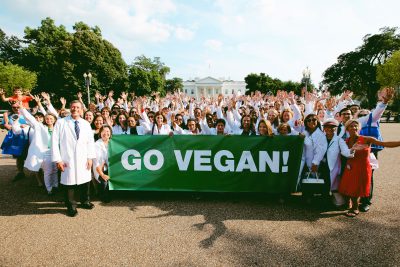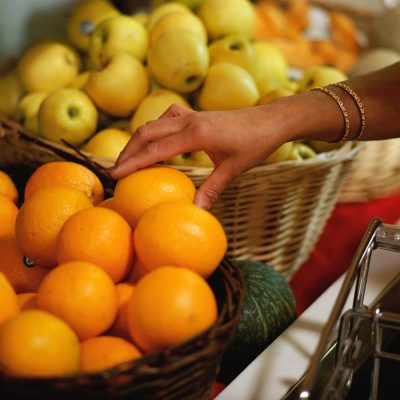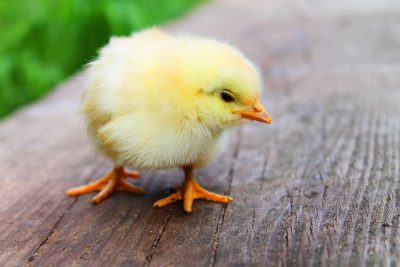This is a question with two possible meanings: What would happen if everyone became vegan overnight? And what would happen if the number of vegans kept rising until everyone on the planet was vegan?
This distinction matters, not least because the first scenario is impossible and the second is a goal—albeit an ambitious one—that we must head towards.
When people ask, ‘What would happen if everyone became vegan?’ they envisage farmed animals being turned out into the wild to fend for themselves and/or becoming extinct. No wonder people worry about it!
But in an uncertain world, one thing is absolutely sure – the whole world will not be vegan by this time tomorrow, so, we can set aside this scenario and look at the more likely one: that over the coming years there will be more and more vegans, vegetarians, flexitarians, and reducetarians.
If we do get to the point where everyone is vegan, this is how our world will look…
Suffering will be massively decreased
Factory farms and slaughterhouses with all the suffering they inflict will be a thing of the past. Our food will be picked and cut, not beaten and bled. Millions of day-old male chicks will not be gassed to death or shredded alive by the egg industry; male calves will not be shot because they’re not able to make milk.
For those of us who despise the deliberate infliction of harm on—and the subjugation of—other beings, this will certainly be a kinder, more compassionate world.
Wildlife will keep their homes
And it won’t just be a good day for farmed animals; wild animals will have reason to rejoice. Animal agriculture is one of the main drivers of deforestation and the loss of wild animal populations.
This is because meat production is so resource-heavy. It needs a lot more water and energy, and crucially a lot more land than if we all ate plant foods. To keep up with global demand, forests and other ancient habitats are decimated to make way for grazing or to grow crops to feed to farmed animals.
Without this devastation, wild places would have a chance to be wild again. While we cannot reverse extinctions, we can still save the species we have, and let the wild creatures live out their lives and raise their young without fear of the bulldozers ripping apart their homes.
Global warming will slow down
Since animal agriculture is one of the leading emitters of climate-changing gases, we would have a chance of slowing down the heating of the atmosphere, and keeping global temperature rise below the catastrophic 1.5 degrees.
If we can do this, we will save more species, protect more habitats, spare countless human lives, and reduce the number of refugees displaced by devastating weather events. Life will be much kinder to us all.
There will be less pollution
In a vegan world, pollution would be reduced as there would be no industrial animal farms leaching slurry into the waterways, killing off aquatic life and creating ocean dead zones. Animal agriculture creates air pollution as well as water and soil pollution, and so those who live in the countryside will be able to breathe more easily.
Humans will be healthier
In a vegan world, we would have a chance to get a grip on antimicrobial resistance. Far too many antibiotics are fed to farmed animals in an attempt to keep them alive for just the few weeks or months until they are slaughtered. This widespread use of antibiotics leads to the emergence of superbugs, and threatens to take us back to the bald old days when people died from simple infections.
Without slaughterhouses, we would not be asking our fellow humans to undertake a task that we ourselves are not prepared to do, and which increases their risk of suffering post-traumatic stress disorder and perpetration-induced stress disorder. Research suggests violence increases in areas where slaughterhouses open, and the links between those who harm animals and those who harm people continue to be explored.
And we would be healthier. Vegans suffer less from some of the world’s biggest killers such as heart disease, type 2 diabetes, and some kinds of cancer. Research shows vegetarians may live longer than meat eaters, and vegans may live longer still.
Would farmed species become extinct if everyone was vegan?
It’s possible that some purpose-bred strains of animals would no longer be bred, and for many of them—including the billions of chickens reared to put on so much weight they are prone to broken bones and heart disease—that would be a good thing. It is right that these poor creatures should not be bred to suffer just so we can have cheap meat. In reality, we would not expect these breeds to become fully extinct, as some will be supported and cared for in homes and sanctuaries. And of course, their wild cousins still exist.
We should remember that by breeding animals for meat, we are driving countless wild species to extinction, so if preserving species is truly our motivation, we would be wise to be vegan.
A vegan world is one that benefits people, animals and planet. Download your Vegan Starter Kit here.
Kate Fowler is our Director of Communications. Kate has been vegan for almost 30 years. She has worked on many media and political campaigns, including exposing the suffering of farmed animals at slaughter.



